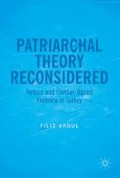Abstract
In this section, the author analyzes various forms of research methodologies with their strengths and limitations. In this chapter, empirical and theoretical research is introduced to the reader with its ability to discern and categorize data. Qualitative methods are introduced as a framework to understand the methods used for this research. These methods include content analysis, participant observation, and semistructured and unstructured interviews. Other components of this research discussed in this chapter are, namely, data triangulation and participants. In addition, analyzing data and ethical considerations are also included in this chapter.
Access this chapter
Tax calculation will be finalised at checkout
Purchases are for personal use only
Notes
- 1.
By the term “forefront,” I stress a meaning of which women are taking leading roles in society and somehow the government consultant interviewed suggested that was a problem.
Bibliography
Abela, A., Vetere, A., and Scarri, C. (2012), “Ethical Dilemmas of a Researcher/Clinician Interviewing Women Who Have Grown Up in a Family Where There Was Domestic Violence”, International Journal of Qualitative Methods, Vol. 11, No. 2, pp. 102–131.
Al-Ali, N. (2005), “Reconstructing Gender: Iraqi Women Between Dictatorships, War, Sanctions and Occupation”, Third World Quarterly, Vol. 26, No. 5, pp. 739–758.
Atkins, M. (1984), “Practitioner as a Researcher, Some Techniques for Analysing Semi-Structured Data in Small Scale Research”, British Journal of Education Studies, Vol. 32, No. 3, pp. 251–261.
Bekhet, Abir K., and Jaclene A. Zauszniewski. (2012), “Methodological triangulation: an approach to understanding data”, Nurse researcher, Vol. 20, No. 2, pp. 40–43.
Charmaz, K. (2006), Constructing Grounded Theory: A Practical Guide Through Qualitative Analysis, London: Sage.
Denzin, N. (1978), The Research Act: A Theoretical Introduction to Sociological Methods, New York: McGraw Hill.
Dootson, S. (1995), “An In-Depth Study of Triangulation”, Journal of Advanced Nursing, Vol. 22, No. 1, pp. 183–187.
Dornyei, Z. (2007), Research Methods in Applied Linguistics, Oxford: Oxford University Press.
Elmire, R., Schmied, V., Jackson, D., and Wilkes, L. (2011), “Interviewing People About Potentially Sensitive Topics”, Nurse Researcher, Vol. 19, No. 1, pp. 12–16.
Holland, J., and Ramazanoglu, C. (2002), Feminist Methodology, London: Sage Publications.
Joseph, S. (1993), “Connectivity and Patriarchy Among Urban Working Class Arab Families in Lebanon”, Ethos, Vol. 21, No. 4, pp. 452–484.
Kandiyoti, D. (1988), “Bargaining With Patriarchy”, Gender and Society, Vol. 2, No. 3, pp. 274–290.
Kandiyoti, D. (1991a), Women, Islam and the State, London: Macmillan.
Lewis, S., Zamith, R., and Hermida, A. (2013), “Content Analysis in an Era of Big Data: A Hybrid Approach to Computation and Manual Methods”, Journal of Broadcasting and Electronic Media, Vol. 57, No. 1, pp. 34–52.
Mays, N., and Pope, C. (1995), “Rigour and Qualitative Research”, BMJ: British Medical Journal, Vol. 311, No. 6997, pp. 109.
Opdenakker, R. (2006), “Advantages and Disadvantages of Four Interview Techniques”, Qualitative Research Forum: Qualitative Social Research, Vol. 7, No. 4.
Pateman, Carole. (1988), The Sexual Contract, Cambridge: Polity Press.
Phillips, A. (1991), Engendering Democracy, Cambridge: Polity Press.
Redfern, S., and Norman, J. (1994), “Validity Through Triangulation: How does the Researcher Make Judgements about the Validity of his or her Data? This is a Question Relevant for all Research, but Offers a Particular Challenge for Naturalistic Research Inquiry. The Authors Map out the Particular Problems and Opportunities Presented by Observational Research”, Nurse Researcher, Vol. 2, No. 2, pp. 41–56.
Reinharz, S. (1992), Feminist Methods in Social Research, Oxford: Oxford University Press.
Shorideh, F., Ashktorab, T., and Yaghmaei, F. (2012), “Iranian Intensive Core Unit: Nurses More Distress: A Content Analysis”, Nursing Ethics, Vol. 19, No. 4, pp. 464–478.
Silverman, D. (2011), Interpreting Qualitative Data, London: Sage.
Swift, A., and Draper, A. (2010), “Qualitative Research in Nutrition and Dietetics: Data Collection Issues”, Journal of Human Nutrition and Dietetics, Vol. 24, No. 1, pp. 3–12.
Walby, Sylvia. (1990), Theorising Patriarchy, London: Blackwell.
Yuval-Davis (1997), Gender and Nation, London: Sage.
Author information
Authors and Affiliations
Rights and permissions
Copyright information
© 2017 The Author(s)
About this chapter
Cite this chapter
Akgul, F. (2017). Methodology. In: Patriarchal Theory Reconsidered. Palgrave Macmillan, Cham. https://doi.org/10.1007/978-3-319-49766-2_2
Download citation
DOI: https://doi.org/10.1007/978-3-319-49766-2_2
Published:
Publisher Name: Palgrave Macmillan, Cham
Print ISBN: 978-3-319-49765-5
Online ISBN: 978-3-319-49766-2
eBook Packages: Political Science and International StudiesPolitical Science and International Studies (R0)

